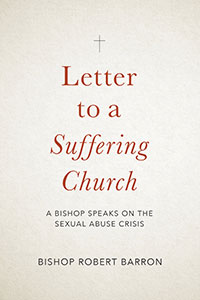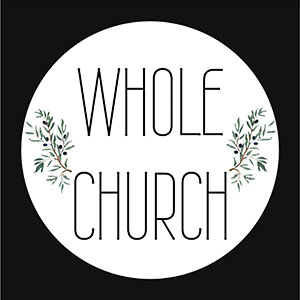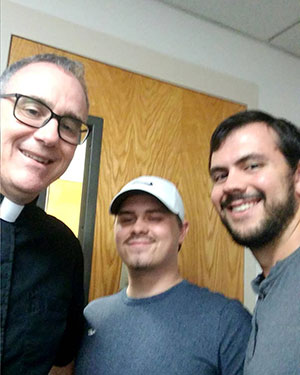"Letter to a Suffering Church: A Bishop Speaks on the Sexual Abuse Crisis" by Bishop Robert Barron. Word on Fire (Park Ridge, Illinois, 2019).
105 pp., free plus $5.95 shipping and handling.
 The title of Bishop Robert E. Barron's "Letter to a Suffering Church" led me -- as a survivor of childhood sexual abuse -- to hope for a book like Father Thomas Berg's excellent 2017 work "Hurting in the Church."
The title of Bishop Robert E. Barron's "Letter to a Suffering Church" led me -- as a survivor of childhood sexual abuse -- to hope for a book like Father Thomas Berg's excellent 2017 work "Hurting in the Church."
Father Berg wrote for Catholics who were victimized by fellow Catholics. Using St. Paul's image of the church as body of Christ, he sought to help wounded readers come to see how the church's fundamental holiness remains despite the sins of individual members.
Bishop Barron, an auxiliary bishop of the Los Angeles Archdiocese, echoes some of Father Berg's points -- he observes that the church "is an organism, not an organization" -- but with a different aim. His book is not for those who are themselves suffering; a more apt title would be "Letter to a Scandalized Church." Bishop Barron's mantra, repeated seven times across 105 pages, is that Catholics angry about clergy abuse should not leave the church but should rather "stay and fight."
What we have here, then, is a pugilistic, often polemic book -- heavy on seething, light on healing. Bishop Barron writes that "sexual abuse of young people ... is a rot, a disease, a threat to the great principles of the church that we hold dear." The answer is to "fight by raising your voice in protest; fight by writing a letter of complaint; fight by insisting that protocols be followed; fight by reporting offenders; fight by pursuing the guilty until they are punished; fight by refusing to be mollified by pathetic excuses."
On the positive side, Bishop Barron advises, "fight by your very holiness of life; fight by becoming the saint that God wants you to be; fight by encouraging a decent young man to become a priest; fight by doing a holy hour every day for the sanctification of the church; fight by coming to Mass regularly; fight by evangelizing; fight by doing the corporal and spiritual works of mercy."
There is nothing inherently wrong in this approach and much to appreciate. Certainly, Bishop Barron's tone is preferable to that of some prelates who have failed to show appropriate anger over abuse.
Nonetheless, it is disappointing that Bishop Barron omits any mention whatsoever of how the reader might fight abuse by personally accompanying victims.
Catholic ministries aiding abuse victims may be few, but they do exist. In Bishop Barron's hometown of Chicago, the archdiocesan Domestic Violence Outreach trains parishes to become welcoming places for those who have suffered abuse at home; surely something similar could be done for victims of clergy abuse. In the Diocese of Charleston, South Carolina, the Foundation of Peace organizes days of healing for survivors. And on the grassroots level, the Maria Goretti Network, founded by a clergy abuse survivor and a diocesan priest, helps parishes across the United States form victim-led support groups so survivors may heal in an atmosphere of prayer and fellowship.
The back cover of "Letter to a Suffering Church" says "all profits from the sale of this book will go directly to organizations who support sexual abuse victims." That's good. But why doesn't Bishop Barron identify those organizations so his readers might likewise support them? Why, in encouraging readers to practice "corporal and spiritual acts of mercy," does he fail to identify even one concrete means by which they might bring such mercy, beyond attending holy hour?
Pope Francis said in his first papal interview that "the thing the church needs most today is the ability to heal wounds and to warm the hearts of the faithful." What is most lacking in Bishop Barron's book is this vision of the church as a "field hospital" where "we must accompany people."
It is easy to denounce abuse and say that the faithful are right to be angry about it. What is not easy -- neither for Bishop Barron, nor, it seems, for the U.S. bishops at large -- is to exhort the faithful to take appropriate initiatives, in union with their shepherds, to respond to the need for healing in their own communities.
— Dawn Eden Goldstein, Catholic News Service
 CHARLOTTE — Much about the Catholic faith can be learned by understanding other religions.
CHARLOTTE — Much about the Catholic faith can be learned by understanding other religions.
Father Pat Hoare, pastor of St. Matthew Church in Charlotte, was recently the guest on “The Whole Church” podcast, a locally-produced show about Christian unity.
Joshua Noel, an evangelical Christian who lives in Charlotte, launched the podcast earlier this year. He produces the show with help of his friend, T.J. Blackwell. In each weekly episode, they talk to representatives from various Christian churches about how Christians can overcome barriers to mutual understanding.
The podcast invitation presented an opportunity to have a dialogue and answer questions, dispel any misconceptions people might have about the Catholic faith, and possibly entice someone to explore the faith a little further, Father Hoare said.
“I thought it went well,” Father Hoare said of the July 30 podcast episode. “They were sincerely interested, which made the conversation a lot easier. They were left with a positive impression of our parish, the Catholic Church and a better understanding of the Catholic faith.”
Noel said he started his online ministry a few years ago, sometimes featuring a podcast on his website – that is, until his microphone broke. After he posted online about the broken microphone, someone sent him a new one, he said. The generosity offered a moment to reflect.
“We prayed about what we wanted our podcast to look like,” Noel said. “We’ve always been big on getting the church to unite, and we wanted to see who we could talk to about the church being united. Turns out, a lot of people have a lot to say about unity in the church.”
 (Photo via Facebook)“The Whole Church” podcast was the result of his reflection. It has featured Christian authors, Protestant church leaders, and a family that belongs to the Church of Jesus Christ of Latter Day Saints (Mormons). The podcast has also tackled polarizing topics such as speaking in tongues. Father Hoare was the first Catholic guest on the program.
(Photo via Facebook)“The Whole Church” podcast was the result of his reflection. It has featured Christian authors, Protestant church leaders, and a family that belongs to the Church of Jesus Christ of Latter Day Saints (Mormons). The podcast has also tackled polarizing topics such as speaking in tongues. Father Hoare was the first Catholic guest on the program.
“I like to think I’m a really spiritual person,” Noel said. “It’s interesting, though, just being in Father Pat’s office, you can feel that he’s close to God.
“He doesn’t believe the same as me, but you can tell just being near him, ‘This guy is close to God.’ It’s moving to be in a scenario where someone who is so different as far as beliefs, but we’re the same as well.”
It was a fun first conversation with Father Hoare, Noel said, and he would like to go deeper into the Catholic faith with future podcast episodes.
Noel said he is fascinated by religion. He grew up attending Pentecostal churches, with some experience in the Assemblies of God branch of Pentecostalism. He said he has family who are Catholic, and he’s always had a lot of questions about the Catholic faith. While attending UNC-Wilmington, he studied world religions from the secular point of view, he said. He also spent time with the Catholic Campus Ministry program there before he transferred to a Baptist Church-run college.
“The Whole Church” podcast reaches about 150 people a week, Noel said.
“We have a small audience, but they’re very active,” he said. “We’re seeing some of the bridges being crossed. They see where unity does not mean we have to agree. It’s about understanding.”
Noel said their goal is to explore what more can be done to promote Christian unity at an individual and local church level. They learn from each of their guests, he said, and he hopes their audience learns as well.
“We’d like to help people become more familiar with what their church believes and help them come together and know what the church stands for,” Noel said. “I always knew the ‘unity thing’ was an issue, but as we move along, we’re finding out why.”
There’s a lot to be gained from fostering unity and understanding across Christian traditions, especially in the South, Father Hoare said.
“People may be predisposed against a faith tradition,” he said. “But they’ve never really met a Catholic or interacted with them. I think the dialogue is important – instead of just rejecting an idea.”
Possibilities are endless when one understands another person’s beliefs, he said, and when one appreciates that other people are seeking a closer relationship with God, just as Catholics are.
— Kimberly Bender, online reporter
Listen to the podcast
At patreon.com/thewholechurchpodcast: Check out the “Whole Church” podcast episode with Father Patrick Hoare and all of the podcast archives. The podcast is also available on Spotify, Apple and Listennotes.

